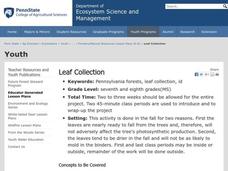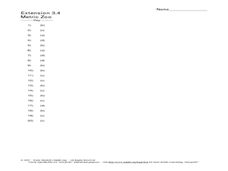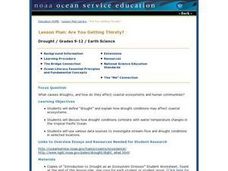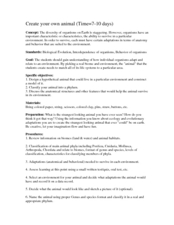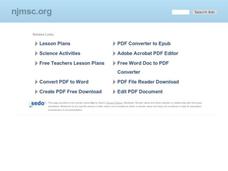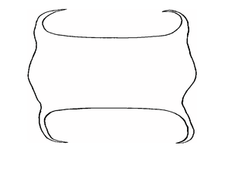Curated OER
Where's My Bot?
Young scholars estimate geographic position based on speed and air travel. In GPS lesson students use GPS to estimate the set and drift of currents.
Curated OER
Needs and Wants
Students demonstrate responsible consumer choices. In this social studies instructional activity, students read The Lorax and discuss wants and needs. Students discuss how to save natural resources by making informed consumer choices.
Curated OER
Digging Up The Facts
Students research environmental issues. In this environmental lesson, students use the Internet to research an environmental problem and list ten facts about it. Students write a summary of facts.
Curated OER
Leaf Collection
Students examine the tree species in Pennsylvania. In this Pennsylvania tree lesson plan students use field guides to assist them in identifying tree species.
Curated OER
Dinosaurs 1: Where are the Dinosaurs?
Students study dinosaurs and explore the concept of extinction. In this dinosaur lesson students create dinosaur eggs and view dinosaur dioramas.
Curated OER
Prince William's Oily Mess: A Tale of Recovery
In this environment worksheet, students explore the effects of the Exxon Valdez oil spill. Students read and study text and photographs about the 1989 spill. Students answer 6 essay questions.
Curated OER
Explorit's Wetlands Quiz
In this wetlands instructional activity, students complete a 31 question multiple choice on-line interactive quiz about marshes and wetlands.
Curated OER
Explorit's Wetlands Quiz
In this wetlands worksheet, students complete a 31 question multiple choice on-line interactive quiz about wetlands. Included are questions about plants, animals and geography.
Curated OER
It Bears Repeating!!!
Students research bears and their characteristics with a specific study on North American bears and polar bears. In this bear study instructional activity, students read books about polar bears and wild bears. Students complete...
Curated OER
Using Metric Measurement at the Zoo
In this using metric measurement at the zoo worksheet, student solve twenty multiple choice problems about the weight and length of zoo animals using the metric system.
Curated OER
Are You Getting Thirsty?
Students study droughts and how they affect communities and coastal ecosystems. In this ecosystems lesson students use data to examine drought conditions in certain areas.
Curated OER
Is It Getting Hot In Here?
Students describe several factors and ways climate change could effect communities. In this climate change lesson plan students research climate change and complete a worksheet.
Curated OER
Spectacular Squid
Students study squid including what family they are in. In this exploratory lesson students view a video, answer questions and complete an activity on squid.
Curated OER
Observation Hike
Students participate in an observational hike to study the natural surroundings. In this observational hike lesson, students hike through a state park and observe the plant and animal life. Students learn about appropriate...
Curated OER
Breeding Bird Atlas Activity
In this breeding birds instructional activity, students read a passage about birds and the Breeding Birds Atlas, then answer a set of comprehension questions based on graphs, maps and pictures given. Questions have multiple components.
Curated OER
Create Your Own Animal
Students design and create their own hypothetical animal. In this biology lesson plan, students identify the factors organisms need to survive. They classify their animals according to its correct phylum.
Curated OER
C.S.I. on the Deep Reef
Students study chemotropic sybioses and chemotropic nutrition. In groups, they complete a Chemotrophic Species Investigations (CSI) Worksheet.
Curated OER
Ring Detectives
Students describe the overall flow of the Gulf Stream, and explain how it affects biological communities in the North Atlantic Ocean.Students describe Gulf Stream rings, and explain how they are formed.Students be abl
Curated OER
Skates
Students gain understanding of structure, characteristics, and basic needs of living things and their role in world, identify parts of skate, observe details of skate's body and skate egg case, and identify unique characteristics of skates.
Curated OER
Who's Your Neighbor?
Students recognize and identify some of the fauna groups found in deep-sea coral reef communities. They describe common feeding strategies used by benthic animals in deep-sea coral reef communities.Students be able
Curated OER
Birds of Wisconsin
First graders explore the job done by ornithologists. They role play identifying the characteristics that make a bird a bird. They discuss what makes each bird species unique. Students are introduced to Wisconsin's most common and rare...
Curated OER
Understanding Estuaries
Students work together to develop their own estuarine ecosystem in an aquarium. They observe the aquarium daily and record them in a notebook. They discuss the different interactions they see with the class.
Curated OER
Our Changing Environment-- A Demonstration
Young scholars observe and describe changes in an environment when some of the components are changed. They recognize the process of succession by
preparing a miniaturized environment in which a variety of plants and seeds are grown.
Other popular searches
- Animals Water Habitats
- Animal Water Habitats
- Land or Water Habitats
- Shallow Water Habitats
- Water Habitats Lesson Plans
- Describe Water Habitats
- Water Habitats Rivers





